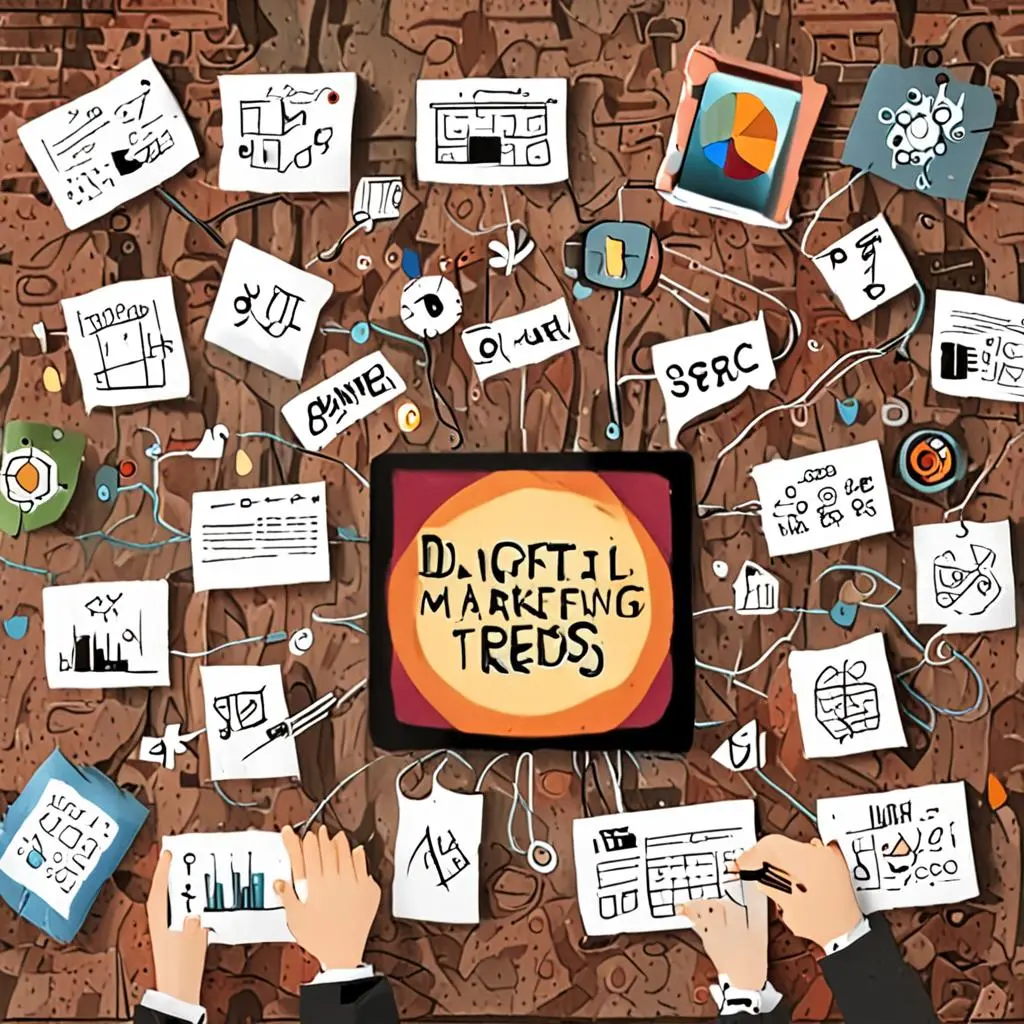Digital marketing has come a long way from simple banner ads and email newsletters. and Today, it’s an evolving field with these new trends emerging fast. As we step into 2024, businesses must stay ahead of the curve and adapt to these changes. Why? Because digital marketing is more competitive than ever, those who fail to innovate risk being left behind. So, let’s dive into the top digital marketing trends in 2024 that are set to shape.

Table of Contents
1-Rise of Artificial Intelligence in Digital Marketing
AI-Powered Customer Service
Artificial Intelligence (AI) is revolutionizing customer service. Chatbots and virtual assistants are becoming the norm, providing instant responses and 24/7 support. These AI-driven tools can handle multiple queries simultaneously, ensuring that no customer is left waiting. Plus, they can offer personalized responses based on customer data, enhancing the overall experience.
Predictive Analytics
Predictive analytics is another AI-driven trend that’s gaining momentum. By analyzing past behaviors and patterns, businesses can predict future trends and customer needs. This allows for more targeted marketing campaigns, better inventory management, and improved customer retention rates. In 2024, expect predictive analytics to become even more sophisticated and integral to marketing strategies.
AI-Driven Content Creation
AI isn’t just for data analysis and customer service; it’s also making waves in content creation. AI tools can now generate high-quality content, from blog posts to social media updates. While they may not replace human writers entirely, they can certainly assist in creating engaging and relevant content more efficiently.
2-Voice Search Optimization
Importance of Voice Search
Voice search is no longer a novelty; it’s a necessity. With the rise of smart speakers and voice-activated assistants like Alexa and Siri, more people are using voice search to find information. This shift means that businesses need to optimize their content for voice search to remain visible and relevant.Digital Marketing
Optimizing Content for Voice Search
To optimize for voice search, focus on natural language and conversational queries. People speak differently than they type, so incorporating long-tail keywords and question-based phrases is essential. Additionally, ensure that your website loads quickly and is mobile-friendly, as these factors also influence voice search rankings.
Voice Search and Local SEO
Voice search and local SEO go hand in hand. Many voice searches are location-based, such as “near me” queries. To capitalize on this trend, make sure your business’s local listings are up-to-date and accurate. Encourage satisfied customers to leave positive reviews, as these can boost your local search rankings.
3-Video Marketing Domination
Short-Form Videos
Short-form videos are taking the digital marketing world by storm. Platforms like TikTok and Instagram Reels have popularized this format, and it’s proving to be highly effective. Short, engaging videos can capture attention quickly and are more likely to be shared, increasing your reach organically.
Digital Marketing Live Streaming
Live streaming is another video trend that’s here to stay. Whether it’s a product launch, a behind-the-scenes look, or a Q&A session, live videos create a sense of urgency and authenticity. They allow real-time interaction with your audience, fostering a deeper connection and driving engagement.
Interactive Videos
Interactive videos are a powerful way to engage viewers. These videos allow users to click, choose, and interact with the content, making the experience more immersive. Whether it’s a shoppable video or an interactive tutorial, this format can significantly enhance viewer engagement and drive conversions.
4-Social Commerce Digital Marketing
Shopping Directly on Social Platforms
Social commerce is transforming the way people shop online. Platforms like Instagram, Facebook, and Pinterest now offer integrated shopping features, allowing users to purchase products without leaving the app. This seamless shopping experience is convenient for consumers and provides businesses with a direct sales channel.
Influencer Partnerships
Influencer marketing continues to thrive, but it’s evolving. In 2024, expect to see more long-term partnerships between brands and influencers. These collaborations can build trust and credibility, as influencers become genuine advocates for the brands they endorse. Micro-influencers, with their niche audiences, will also play a significant role in social commerce.
User-Generated Content
User-generated content (UGC) is a goldmine for social commerce. Encouraging customers to share their experiences and tag your brand can create authentic content that resonates with potential buyers. UGC not only builds trust but also expands your reach as users share their content with their networks.
5-Personalization and Customer Experience
Hyper-Personalized Content
Personalization has moved beyond addressing customers by their first names in emails. Today, it’s about delivering hyper-personalized content that caters to individual preferences and behaviors. AI and machine learning are key to achieving this level of personalization, allowing businesses to tailor their messages more accurately than ever before.
Data-Driven Personalization
Data is the backbone of personalization. By analyzing customer data, businesses can gain insights into buying patterns, preferences, and pain points. This information can then be used to create personalized marketing campaigns that resonate with each customer, enhancing their overall experience.
Enhancing Customer Experience
A great customer experience goes hand in hand with personalization. By understanding and anticipating customer needs, businesses can provide seamless and enjoyable experiences. From personalized product recommendations to proactive customer support, every touchpoint should reflect a deep understanding of the customer.
6-Privacy and Data Security
Impact of Privacy Laws
With increasing concerns about data privacy, laws and regulations are becoming stricter. GDPR, CCPA, and other privacy laws are setting the standard for how businesses handle customer data. In 2024, compliance with these regulations will be more critical than ever, as non-compliance can lead to hefty fines and reputational damage.
Building Trust with Transparency
Transparency is key to building trust with your audience. Be open about how you collect, use, and protect customer data. Providing clear and concise privacy policies, and allowing customers to control their data, can go a long way in establishing trust and loyalty.
Ethical Data Collection
Ethical data collection practices are essential in today’s digital landscape. This means obtaining explicit consent from customers before collecting their data and ensuring that data is used responsibly. Ethical data practices comply with regulations and build a positive brand image.
7-Augmented Reality (AR) and Virtual Reality (VR)
AR for Interactive Shopping
Augmented Reality (AR) is changing the way people shop online. With AR, customers can visualize products in their own space before making a purchase. This technology is particularly useful for industries like fashion and home decor, where seeing a product in context can significantly influence buying decisions.
VR for Immersive Experiences
Virtual Reality (VR) offers immersive experiences that can transport users to different environments. For instance, VR can be used for virtual tours, allowing customers to explore properties, travel destinations, or even attend virtual events. This level of immersion can create memorable experiences and drive engagement.
Combining AR and VR in Campaigns
Combining AR and VR in marketing campaigns can create unique and engaging experiences. For example, a campaign could use AR to let users try on virtual products, and then use VR to take them on a virtual tour of how those products are made. This multi-faceted approach can captivate audiences and differentiate your brand.
8-Sustainable and Ethical Marketing
Promoting Sustainability
Sustainability is no longer a niche concern; it’s a mainstream expectation. Consumers are increasingly looking for brands that prioritize sustainability and take meaningful steps to reduce their environmental impact. Highlighting your sustainable practices can attract eco-conscious consumers and set your brand apart.
Ethical Branding
Ethical branding goes beyond sustainability. It involves promoting fair trade, supporting social causes, and ensuring ethical labor practices. Brands that align their values with those of their customers can build strong, loyal communities and enhance their reputation.
Consumer Expectations
Consumers today expect brands to be socially and environmentally responsible. Meeting these expectations involves transparency, accountability, and a genuine commitment to making a positive impact. Brands that fail to meet these expectations risk losing credibility and customer trust.
Conclusion
In conclusion, 2024 promises to be an exciting year for digital marketing trends, with AI, voice search, video marketing, social commerce, personalization, privacy, AR/VR, and sustainability leading the charge. Staying updated with these trends and adapting your strategies accordingly will be crucial for success. The digital landscape is ever-changing, but by embracing these trends, businesses can stay ahead of the curve and thrive in the competitive market.
FAQs
How can small businesses leverage AI in digital marketing trends 2024?
Small businesses can leverage AI by using AI-powered tools for customer service, predictive analytics, and content creation. These tools can help automate tasks, provide insights, and enhance customer interactions, even with limited resources.
What are the best practices for voice search optimization?
Best practices for voice search optimization include using natural language and conversational queries, incorporating long-tail keywords, ensuring fast website load times, and optimizing for mobile devices. Additionally, keeping local listings up-to-date can improve local voice search rankings.
How do I start with video marketing?
To start with video digital marketing, identify your target audience and choose the right platforms. Create engaging and relevant content, experiment with different formats like short-form videos, live streaming, and interactive videos, and track performance metrics to refine your strategy.
What is social commerce and why is it important?
Social commerce involves selling products directly through social media platforms. It’s important because it provides a seamless shopping experience, leveraging the vast user base of social media to reach potential customers and drive sales directly within the apps.
How can I ensure data privacy in my marketing efforts?
To ensure data privacy, comply with relevant privacy laws and regulations, be transparent about data collection and usage, obtain explicit consent from customers, and implement robust security measures to protect data. Building trust through ethical data practices is essential.


